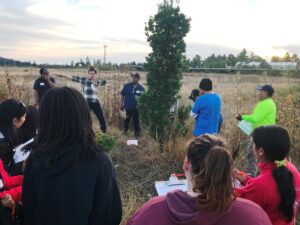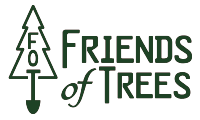Future Urban Forestry & Restoration Professionals: A new education & training program

“One of the things I love most about Friends of Trees and this program is it’s helping me expand my understanding of community. I get to go to all of these places I never knew about and plant there. That is one of my things I’m personally striving for – learning more about my community.” Alyssa, POIC leader and Adult UF training program participant
Friends of Trees recognizes that not everyone has equal access to the benefits of urban trees and healthy green spaces. During the past five years, we have made concerted efforts to include equity, diversity, and inclusion in all aspects of the organization, including hiring practices, volunteer recruiting, and planting street and yard trees in under-served, under-canopied neighborhoods. We also recognize that our region’s urban forestry landscape would benefit from EDI efforts, and the diverse communities we work to engage and serve would benefit from opportunities to engage directly with urban forestry.
Our Adult Urban Forestry Training & Internship Program, funded by the East Multnomah Soil & Water Conservation District, is a 12 week, paid training program focusing on urban forestry and restoration topics. The 12 program participants were selected by local Community Benefit Organizations (APANO, POIC, VERDE, and Wisdom of the Elders) that are also Friends of Trees partners. Program participants attended weekly training sessions focusing on landscape design, tree identification, tree maintenance, ecological site design, environmental justice, and careers in urban forestry.
Key components of this training program include classroom time, field work, and a session dedicated to resume-building and interview skills. Upon completion participants are connected with a 100 hour paid internship with local urban forestry or other restoration programs.
Friends of Trees’ Equity, Diversity & Inclusion Specialist Surabhi Mahajan talks about the community building that took place during the training,
“The best part about it for me was the community that was built with the training sessions. The first training session was a little bit awkward, not a lot of people were talking, people wanted more information about the program itself. But as the sessions went on, participants got comfortable with each other and learned from each other. Some folks had more knowledge about medicinal properties of trees and talked about it with other participants, others grew food in their community garden plots and brought hot peppers to share with everyone. There was such a sense of community with each other in the room that participants were asking me if we can all get together again outside of the training, ‘because we’ve built a sort of community together.’ I call that success!”
Multiple conservation issues are addressed through this program. Our experience is that in general our community is disconnected from their watersheds and the ongoing activities that improve natural areas, public green spaces, trees, and water quality. We created opportunities for Community Benefit Organizations to engage in this work and for communities of color to engage in workforce development opportunities in the conservation sector. Through this program we are also helping to restore a critical natural area (the Powell Butte Lower Flood Plain in SE Portland), planting street trees in Portland neighborhoods, and building connections between individuals and local leaders in the urban forestry field.
Above photo: It’s a bird, it’s a plane, it’s Friends of Trees Neighborhood Trees Vancouver Specialist Megan Van de Mark! Megan is demonstrating canopy spread during a program field trip at the Dharma Rain Zen Center.
Special thanks to Meyer Memorial Trust, whose grant support helps fund our new EDI Specialist position, which was critical to this training.
